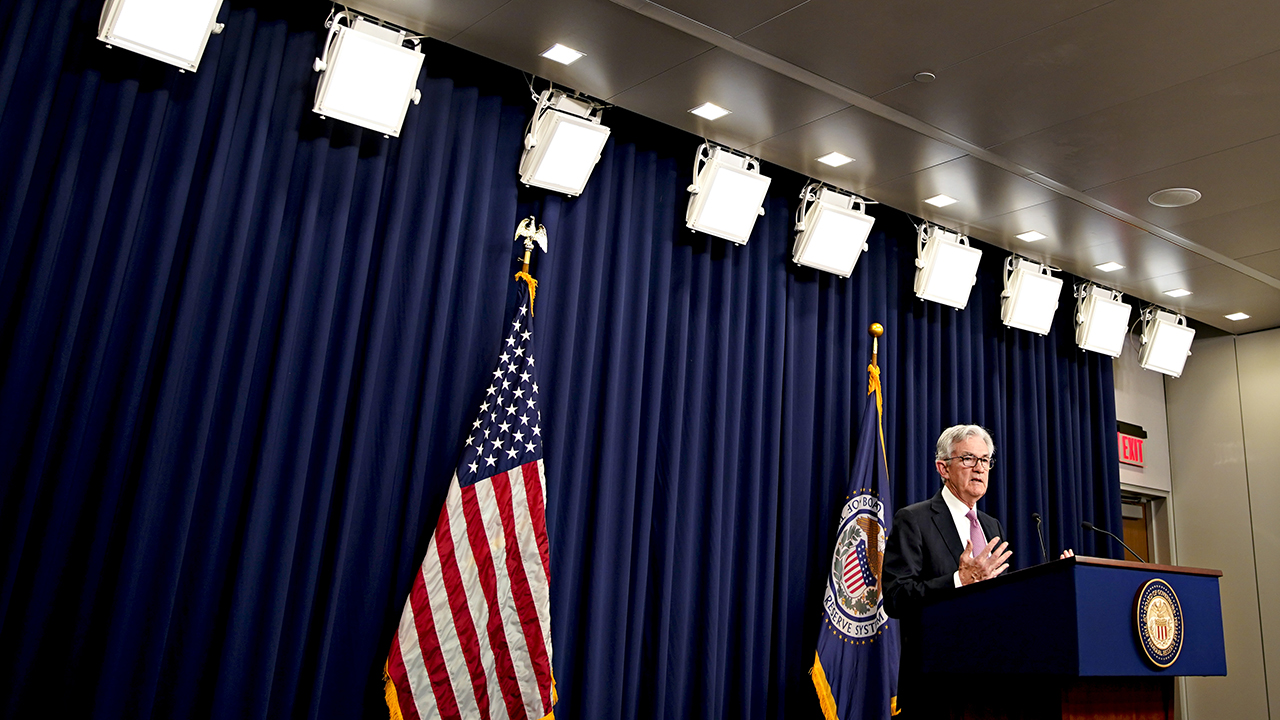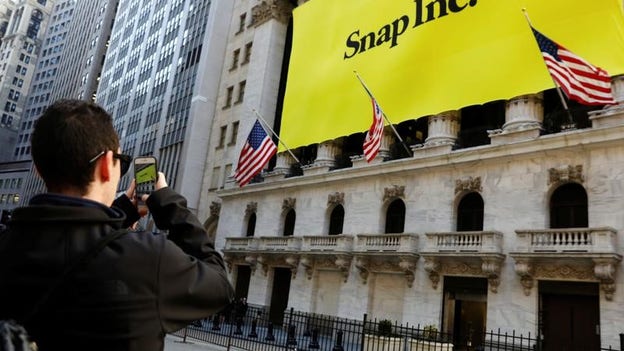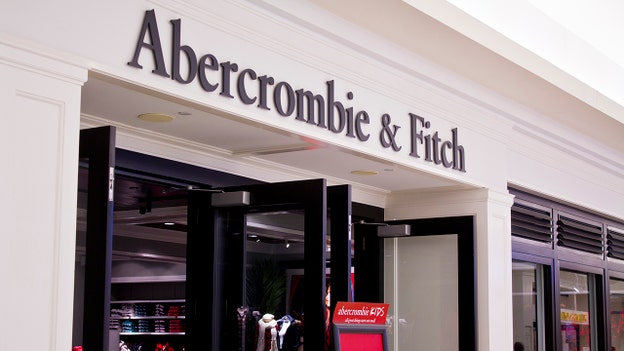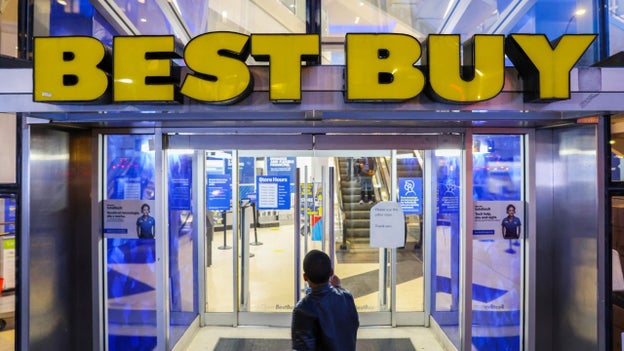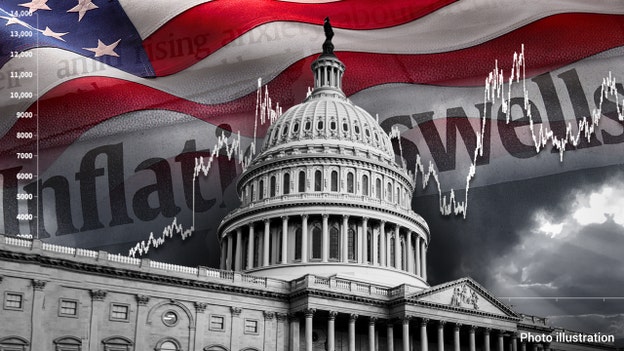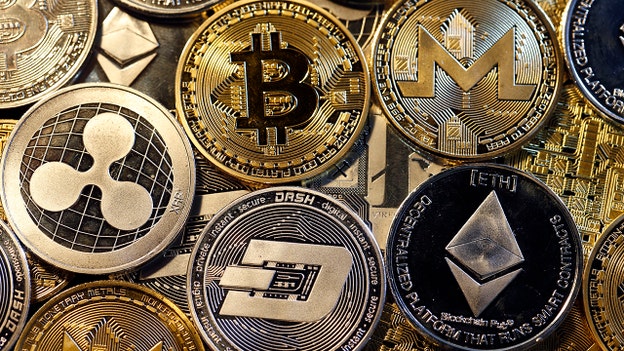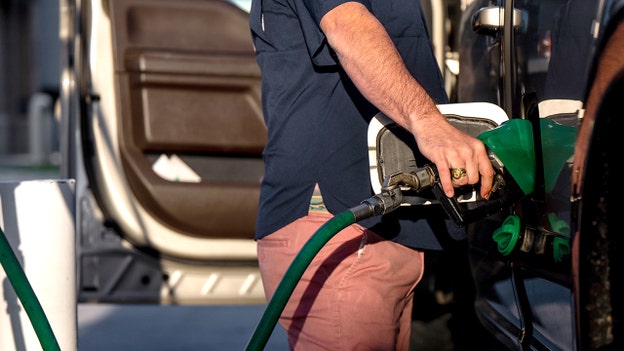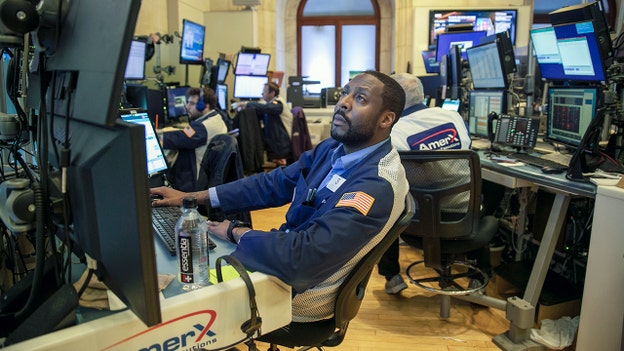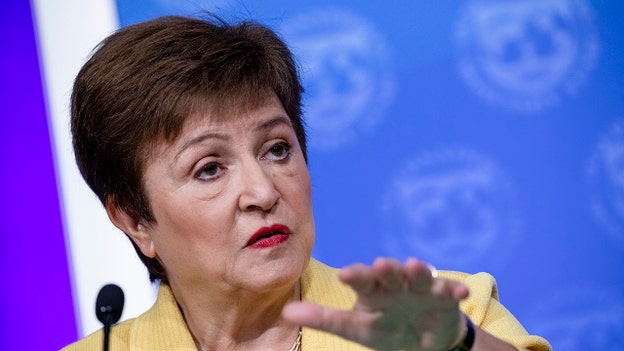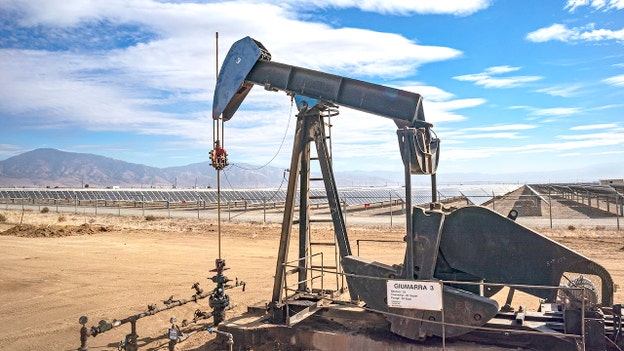Dow recovers, Nasdaq falls as Snap has worst day ever: LIVE UPDATES
Get the latest market news on stocks, bonds and commodities with FOX Business. Real-time updates on the markets and corporate news that will impact your portfolio.
Coverage for this event has ended.
| Symbol | Price | Change | %Change |
|---|---|---|---|
| IBM | $131.17 | +2.69 | +2.09% |
| MCD | $244.74 | +6.71 | +2.82% |
| VZ | $49.67 | +0.14 | +0.28% |
| SNAP | $12.79 | -9.68 | -43.07% |
The Dow Jones Industrial Average staged a late session comeback on Tuesday to close 48 points higher as IBM, McDonald’s and Verizon led the turnaround. The Nasdaq Composite, however, fell 2.3% as Snap shares posted their worst day ever down 43%. In commodities, oil settled at $109.77 per barrel.
| Symbol | Price | Change | %Change |
|---|---|---|---|
| ICE | $98.11 | +0.49 | +0.50% |
| Symbol | Price | Change | %Change |
|---|---|---|---|
| BYND | $22.95 | -1.73 | -6.99% |
| Symbol | Price | Change | %Change |
|---|---|---|---|
| SNAP | $13.13 | -9.33 | -41.53% |
| TWTR | $37.86 | -0.43 | -1.12% |
| FB | $196.23 | +2.69 | +1.39% |
"Since we issued guidance on April 21, 2022, the macroeconomic environment has deteriorated further and faster than anticipated. As a result, we believe it is likely that we will report revenue and adjusted EBITDA below the low end of our Q2 2022 guidance range" SNAP disclosed in an SEC Filing.
| Symbol | Price | Change | %Change |
|---|---|---|---|
| SP500 | $3,881.52 | -92.23 | -2.32% |
| VCR | $235.60 | +1.19 | +0.51% |
| XLC | $58.89 | +0.87 | +1.50% |
| XLP | $72.16 | +1.46 | +2.07% |
The S&P 500 is on pace for the lowest close in 14 months, all 11 of the major sectors are trading down led by communications and discretionary stocks, while staples fell the least.
| Symbol | Price | Change | %Change |
|---|---|---|---|
| SNAP | $22.49 | -0.77 | -3.31% |
Snap shares are down over 30% after the company's profit warning. "Since we issued guidance on April 21, 2022, the macroeconomic environment has deteriorated further and faster than anticipated. As a result, we believe it is likely that we will report revenue and adjusted EBITDA below the low end of our Q2 2022 guidance range. We remain excited about the long-term opportunity to grow our business. Our community continues to grow, and we continue to see strong engagement across Snapchat, and continue to see significant opportunities to grow our average revenue per user over the long term" the company disclosed in an SEC filing.
| Symbol | Price | Change | %Change |
|---|---|---|---|
| ANF | $26.73 | -1.24 | -4.43% |
Fran Horowitz, Abercrombie & Fitch CEO:
"Looking forward, we expect higher costs to remain a headwind through at least year-end. We expect freight relief in the fourth quarter as we anniversary increased air usage last year due to the Vietnam shutdown. We will continue to manage expenses tightly and are committed to finding opportunities to offset these costs while protecting strategic investments in marketing, technology and our customer experience, which should drive sustained, long-term sales growth."
U.S. stocks opened lower with the Nasdaq Composite down over 2% on fresh worries about a slowing economy. Both Snap and Abercrombie and Fitch shares fell 30% each after disclosing headwinds for future growth. In commodities, oil rose to $111 per barrel.
Electronics retailer Best Buy Co. Inc. lowered its full-year sales and profit forecasts on Tuesday, as red-hot inflation saps consumers' spending power.
However, shares jumped 8% in premarket trading after the company beat estimates for first-quarter revenue.
A growing number of economists and money managers are sounding the alarm over a possible return to 1970s-style "stagflation," as the Federal Reserve moves to tame sky-high inflation.
A majority – about 77% — of investment fund managers now say they see "below-trend growth and above-trend inflation" — aka stagflation — as the most likely outcome for the economy over the next year, according to a recent survey from Bank of America Global Research.
Stagflation is the combination of economic stagnation and high inflation, characterized by soaring consumer prices as well as high unemployment. The phenomenon ravaged the U.S. economy in the 1970s and early 1980s, as spiking oil prices, rising unemployment and easy monetary policy pushed the consumer price index as high as 14.8% in 1980, forcing Fed policymakers to raise interest rates to nearly 20% that year.
Although the investment managers believe that inflation in the U.S. has peaked, they are still piling up cash on worries that economic growth could be slowing. Cash levels hit 6.1% in May, according to the survey, the highest level since September 2001. It's also up from 5.5% in April.
Consumer prices jumped 8.3% in April on an annual basis, close to a 40-year high, and are expected to remain elevated in coming months. As a result, the Fed is embarking on its most aggressive course to tighten policy in decades, raising rates by a half-point earlier this month and signaling that similarly sized hikes are on the table at coming meetings.
There are growing fears that the Fed will trigger a recession because hiking interest rates tends to create higher rates on consumer and business loans, which slows the economy by forcing employers to cut back on spending. Bank of America, as well as Fannie Mae and Deutsche Bank, are among the Wall Street firms forecasting a downturn in the next two years.
Read more here.
Cryptocurrency prices were moving higher early Tuesday morning.
At 4 a.m. Tuesday, Bitcoin, Ethereum and Dogcoin were showing gains with Bitcoin trading at more than $29,350, up 0.91%, or $291.65. For the week, however, Bitcoin was lower almost 2.5%. For the month, Bitcoin was down by nearly 26.5%.
Ethereum was higher by 0.56%, or nearly $11, trading at $1,983. For the week, Ethereum was down 2.41% and for the month, it was down nearly 33%.
Dogecoin was higher by 1.1%, or slightly more than $0.001, trading at $0.084. For the week, Dogecoin was lower by 5.16% and for the month, it was trading slightly more than 38% lower.
Read more here.
The average price for a gallon of gasoline in the U.S. rose slightly to another record Tuesday morning surpassing Monday’s record high of $4.596 and continuing a trend of higher prices for the past two weeks, according to the latest numbers from AAA.
Gasoline around the country was selling for an average of $4.5968 per gallon, up $0.002 since Monday. Gas prices remained the same both Saturday and Sunday, AAA reported.
Just one week ago, a gallon of gasoline sold nationwide for $4.523, while a month ago, the price was $4.12.
One year ago, a gallon of gasoline sold nationwide for $3.039, AAA reported.
Read more here .
| Symbol | Price | Change | %Change |
|---|---|---|---|
| I:DJI | $31,880.24 | +618.34 | +1.98% |
| SP500 | $3,973.75 | +72.39 | +1.86% |
| I:COMP | $11,535.27 | +180.66 | +1.59% |
U.S. stocks were lower early Tuesday morning as as worries over inflation tempered optimism over President Joe Biden’s remark early Monday he was considering reducing U.S. tariffs on Chinese imports.
Biden, who announced a new economic and trade initiative with the region while on a visit to Japan, confirmed to reporters he planned to discuss the issue of punitive tariffs imposed on China during former President Donald Trump's administration with Treasury Secretary Janet Yellen once he returns to Washington.
“I'm talking with the secretary when I get home. We are considering it," Biden said.
The comments raised optimism over the potential for an easing of tensions between the world's two biggest economiesInvestors will be searching for clues about the impact that surging inflation is having on profit margins and consumer spending habits, especially after very disappointing results last week from Walmart and Target.
A busy morning is ahead for retail earnings, with Best Buy, AutoZone, Ralph Lauren, Abercrombie & Fitch and Petco posting ahead of the opening bell. In the afternoon the focus will turn to Nordstrom and Urban Outfitters.
Investors are also keeping an eye on the impact of the war in Ukraine on commodity prices and the possible blow to global economic growth from pandemic lockdowns in China.
Wall Street had an upbeat start to the week after seven weeks of declines that have nearly ended the bull market that began in March 2020. The S&P 500 rose 1.9% to 3,973.75, with technology and financial sector stocks doing much of the heavy lifting for the benchmark index. The Dow Jones Industrial Average rose 2% to 31,880.24 and the Nasdaq climbed 1.6% to 11,535.27.
Smaller company stocks staged a rally. The Russell 2000 gained 1.1% to 1,792.76.
Recent heavy selling has primed traders to snap up big tech stocks and shares in other companies that had been high-flyers before the market’s punishing skid, said Quincy Krosby, chief equity strategist for LPL Financial.
Wall Street will also get a few economic updates this week from the Commerce Department. On Thursday it will release a report on first-quarter gross domestic product and on Friday it will release data on personal income and spending for April.
Meanwhile, benchmarks fell in Japan, Australia, South Korea and China, although some of the indexes had been higher earlier in the day.
Japan's benchmark Nikkei 225 declined 0.8% in afternoon trading to 26,793.94. Australia's S&P/ASX 200 was little changed, inching down less than 0.1% to 7,144.30, after fluctuating throughout the day. South Korea's Kospi sank 1.1% to 2,617.38. Hong Kong's Hang Seng shed 1.7% to 20,125.87, while the Shanghai Composite declined 1.2% to 3,109.39.
Read more here.
The outlook for the global economy is rapidly darkening as it confronts crisis after crisis, according to International Monetary Fund Director Kristalina Georgieva.
In a blog post ahead of the World Economic Forum in Davos, Switzerland, this week, Georgieva warned the global economy faces the "biggest test since the Second World War" as it confronts a "potential confluence of calamities," including the Russian war in Ukraine and the continued fallout from the COVID-19 pandemic.
Both the pandemic and the invasion have helped to fuel sky-high inflation across the world while simultaneously dragging down economic growth. Surging food and energy prices are hurting people around the world, while central banks are moving quickly to tighten monetary policy in hopes of taming inflation – further straining indebted nations, companies and families.
She warned that geopolitical disintegration among nations could also have enormous global costs, hurting people across the socioeconomic spectrum. Technological fragmentation alone could shave 5% off of many nations' economies.
"Our ability to respond is hampered by another consequence of the war in Ukraine – the sharply increased risk of geoeconomic fragmentation," Georgieva said. "Tensions over trade, technology standards and security have been growing for many years, undermining growth – and trust in the current global economic system."
The Washington-based institution already slashed its economic outlook this year, projecting that global domestic gross product will grow by 3.6% in 2022 – a 0.8 percentage point drop from its January estimate. On top of that, the IMF expects global inflation to remain elevated as a result of the Ukraine war.
"Global economic prospects have been severely set back, largely because of Russia’s invasion of Ukraine," Pierre-Olivier Gourinchas, the IMF chief economist, wrote in a blog post last month. "This crisis unfolds even as the global economy has not yet fully recovered from the pandemic."
Read more here.
| Symbol | Price | Change | %Change |
|---|---|---|---|
| USO | $81.97 | +0.32 | +0.39% |
| CVX | $171.72 | +3.90 | +2.32% |
| XOM | $93.89 | +2.03 | +2.21% |
Oil prices fell by more than $1 on Tuesday as concerns over a possible recession and China's COVID-19 curbs outweighed an expectation of tight global supply and a pick-up in fuel demand with the U.S. summer driving season.
Brent crude futures for July fell $1.34, or 1.2%, to $112.08 a barrel by 0606 GMT. U.S. West Texas Intermediate (WTI) crude futures for July delivery dropped $1.28, or 1.2%, to $109.01 a barrel.
Brent gained 0.7% on Monday while WTI settled nearly flat.
An embargo on Russian oil imports will likely be agreed on by the European Union "within days," according to its biggest member Germany, as Moscow said it saw its economic ties growing with China after being isolated by the West over its invasion of Ukraine.
The world is facing an oil supply crunch, with most companies afraid to invest in the sector as they face green energy pressures, the head of Saudi Aramco told Reuters, adding it cannot expand production capacity any faster than promised.
Read more here.
Live Coverage begins here


